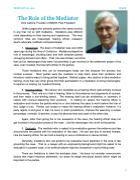FEBRUARY 28, 2019 INADR The Role of the Mediator Dick Calkins, Founder of INADR, Past President Unlike judges who primarily perform the same function in any trial, not so with mediators. Mediators play different roles depending on their training and experience. The most common roles are messenger, hearing offificer, evaluator, devil’s advocate, facilitator and peacemaker. 1. Messenger. The dawn of mediation was over 2000 years ago during the time of Confucius. Mediators played the role of messenger, shuttling back and forth between parties conveying demand and offers. Their role was limited, and other than act as messengers they were not permitted to get involved in the settlement phase of the case, even if asked, that was left entirely to the parties. Those mediators who act as messengers today are few because the process has modest success. Most parties want the mediator to help them solve their problems and introduce creative ways to bring parties together. Retired judges, who decline to take mediation training, more than any other group limit their participation in a mediation to being messengers. It requires no training nor creative thinking. 2. Hearing Offificer. The person who mediates as a hearing offificer gets actively involved in the process. Their role is to hold a hearing, listen to the evidence and arguments of counsel, and then make a non-binding award. The hearing itself can be evidentiary or summary in nature with counsel explaining their positions. In making an award, the hearing offificer is evaluative and informs the parties what he or she believes the case is worth before the trier of fact, judge or jury. Parties can accept or reject the hearing offificer’s evaluation; however, if a party rejects it and goes to trial, he must, in most jurisdictions, improve the award by a certain percentage, normally 10 percent, or pay the attorney fees and costs of the other side. Again, other than giving his or her evaluation of the case, the hearing offificer does not get involved in the solution phase of the case. Like the messenger, this is left to the parties. 3. Evaluator. The mediator who is asked to be evaluative garners the evidence and law and provides the parties with his evaluation of the case. He can use any of several formats. Like the hearing offificer, he can hold a hearing or use a conference or caucus format. Generally, mediators who are asked to be evaluative have expertise in the area of law governing the case. That is, a lawyer with an engineering background might be asked to be evaluative in a patent case, or an antitrust lawyer might be evaluative in a price-fifixing case. There are limitations to what the evaluator does. He does not consider noneconomic factors that might inflfluence settlement, nor does he weigh emotional factors which might be important to the parties. !3
